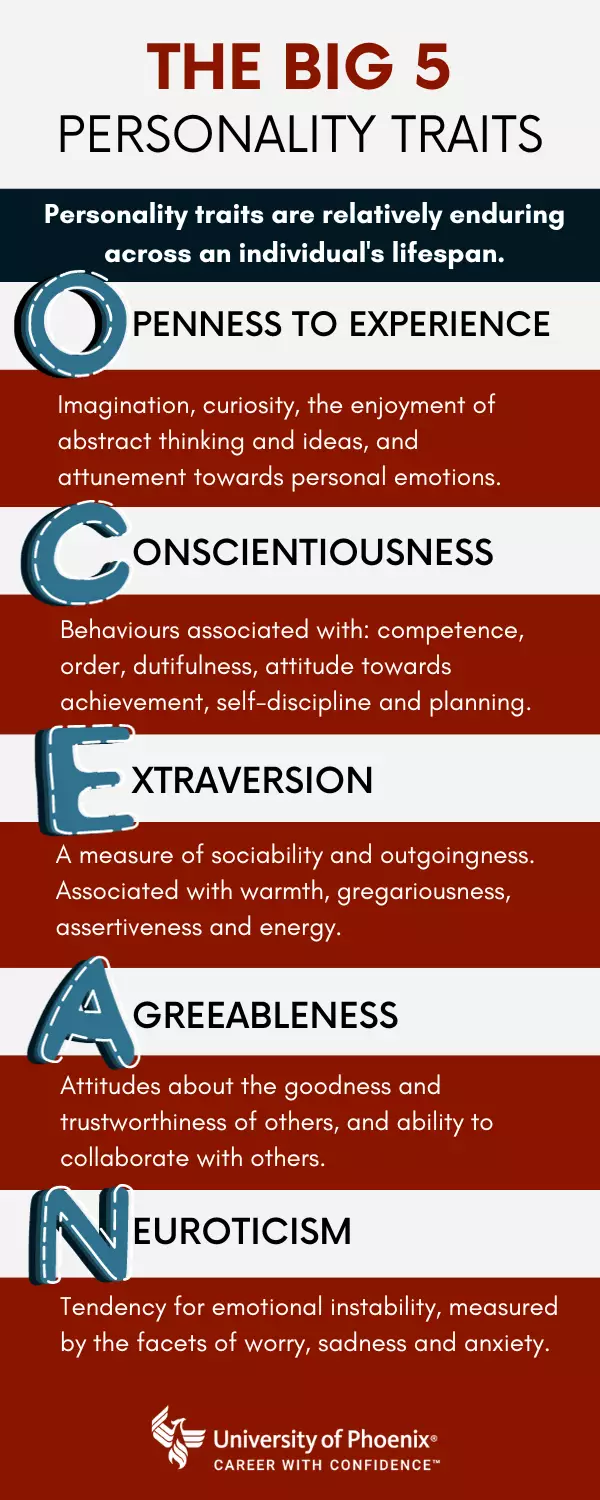How to deal with different personality types in the workplace
This article was updated on December 4, 2023.

Written by Elizabeth Exline

Reviewed by Jessica Roper, MBA, director of Career Services at University of Phoenix

Understanding personality traits
Trait theory is a popular psychological approach to understanding and measuring human traits to define habitual patterns of behaviors, emotions and thoughts. Personality traits, as they are called, play out and impact every facet of our lives, including our work. Some traits are innate and developed early, while others are learned or developed over a person's life.
Regardless of whether personality traits are natural or learned, they have a resounding influence on how we live and work — especially with others. Some personality traits work best in certain environments or situations. Some people with certain traits may not mix well with individuals who have a different or conflicting personality type until empathy in understanding the differences develops.
As employees enter the workforce and move along in their careers, it’s important they understand their own personality traits so they can be used to determine their career trajectory and even the types of employees to work with. Let's take a deep dive into the types of traits and the role they can play at work.
The big 5 personality traits
As the result of multiple studies and theories on personality traits dating back to 1949, the “Big 5” personality traits ultimately became the contemporary psychological way of identifying the basic dimensions of understanding a personality. The five traits are extraversion, agreeableness, openness, conscientiousness and neuroticism. An easy way to remember them is the acronym OCEAN, which puts the traits in the order of openness, conscientiousness, extraversion, agreeableness and neuroticism.
Understanding each trait can provide a building block to better understanding someone’s own personality or that of a co-worker or boss. Here’s a closer look at the five key traits.
Openness
This trait refers to people with a broad range of interests who are open to new experiences and opportunities to learn and grow. These individuals are often highly creative. In the workplace, they prefer transparency in their work and direction. They value collaboration and brainstorming. They also prefer consideration rather than adhering to the direction of a main authority with little input.
Conversely, people low in openness often dislike change and don’t enjoy learning new things or new ideas and may resist unfamiliar or uncomfortable opportunities. Low openness may also lead to difficulty thinking outside the box or being overly imaginative or creative.
Conscientiousness
Conscientiousness refers to being very thoughtful, diligent and careful. People with this trait may be more organized or seen as more efficient in their life and work because they pay close attention to detail.
In the workplace, conscientious employees may spend the majority of their time planning to ensure they get every detail correct or to their preference and then complete a task quickly. Employees with high conscientiousness prefer having a schedule and detailed tasks and work well in an organized environment.
Employees low in conscientiousness, on the other hand, dislike structure and organization. They may prefer an “organized chaos” approach and can come across as messy or unorganized. They may miss deadlines or details. They also may require less structure to feel comfortable in the workplace, and managers may need to remind them of details and deadlines.
Extraversion
Extraversion, sometimes spelled “extroversion,” refers to people who are outgoing and who thrive in social situations. They are often described as high-energy, assertive, talkative and excitable.
Employees with high extraversion work well in large groups or team settings, pulling energy from contact with others. They may speak out in meetings before completely reviewing data or materials and often start or carry a conversation. They may benefit from the opportunity to talk things out and frequently connect with their manager or co-workers.
The opposite is introversion. Introverted individuals dislike large social groups or situations and may feel drained or exhausted by them. They dislike being the center of attention and may choose to remain quiet. Introverted employees may communicate better through email or instant messenger. They may not speak up in meetings, but that may mean they are taking longer to digest the data or materials and think carefully before sharing thoughts or ideas.
Agreeableness
People with high agreeableness are often thought of as honest, sympathetic, cooperative and considerate. They may appear to show great interest in the thoughts and feelings of others and demonstrate a high level of sympathy and care for the people around them.
Employees with this trait enjoy helping others and assisting on work-related tasks. They tend to work well with everyone and can be great for joint-team initiatives or within larger collaborations. The downside of this personality is if you need them to give critical feedback; it may be difficult for them to see what needs to be improved upon.
People low on agreeableness often take little interest in others and may appear to not care or even be competitive. Employees with low agreeableness may not work well in larger groups or outside of their direct team as they may be seen as standoffish, aloof, selfish or lacking empathy. They tend to work better on their own.
Neuroticism
Worry, sadness and anxiety often characterize this trait. People high in neuroticism may have mood swings, be easily upset or be consistently irritable. They may also show signs of envy, jealousy and frustration.
In the workplace, they may cast their feelings on their work when it’s difficult or time-consuming or if they’re passed over for praise or opportunities. Managers can act accordingly to help employees with high neuroticism feel valued and comfortable when these feelings occur.
People low on neuroticism typically feel positive, stable and relaxed. They don’t usually feel stressed and can deal with change or uncomfortable situations well. Such employees may not need as much attention from managers when a situation or assignment is perceived as frustrating or difficult. Managers should understand that people with low neuroticism may seem overly relaxed, but that isn’t necessarily a warning sign.
Bringing your personality traits to work
Some people like to ask about astrological signs, but when it comes to understanding your approach to work and professional collaboration, asking about work personality traits can be more effective.
Think about the specific traits that define you. Are you an introverted thinker? An extroverted feeler? And, perhaps more importantly, which type do you work best with?
The answer, says University of Phoenix career advisor Alice Rush, will likely tie back to the Myers-Briggs Type Indicator (MBTI), an assessment that identifies personality traits according to the following four categories: ![]()
- Energy-building (introversion or extraversion)
- Information-gathering (sensing or intuition)
- Decision-making (thinking or feeling)
- Structure (judging or perceiving)
“The Myers-Briggs Type Indicator [identifies] 16 personality styles, and those absolutely relate to our work styles,” Rush says.
Know thyself
Rush speaks from experience. She has facilitated team-building exercises at major U.S. corporations and has seen how such self-awareness can enhance collaboration and productivity.
Asked to describe yourself, what would you say? Friendly? Hardworking? Analytical? Creative?
In some ways, the characteristics you choose for yourself are revealing. They point to the qualities you value, and they underscore the role you believe you play in the world.
But to really understand your strengths, weaknesses and motivations, Rush says there’s no substitute for the MBTI. Based on Carl Jung’s hypothesis that everyone is born with set of personality traits that don’t really change, this assessment has been repeatedly validated over the eight decades since it was published in 1943.
Each scale of preferences has two options. Everyone aligns, at least the majority of the time, with one of the options in each category for a distinct personality type.
Curious about where you fit in? Here’s how these traits break down:
Introversion vs. extraversion: How you get energy
- Introverts: Your ideal work environment is quiet, distraction-free and probably solitary.
- Extraverts: Teamwork, brainstorming, open office setups — you see these things as a recipe for professional success.
If you’ve ever clashed with a co-worker, it may very well boil down to this difference. “This actually causes a lot of conflict in the workplace,” Rush says. “Extroverts tend to think out loud, and introverts keep their thoughts inside their heads. They complete their thoughts before speaking.
“Introverts can get very irritated by extroverts. They say, ‘Why can’t you just think it through on your own and come talk to me once you’ve figured it out?’ But that can’t happen with the extrovert, because that’s how they figure it out: by talking it out loud.”
The solution? Rush says everyone has to try a little harder to meet in the middle. Extroverts might work to create more concise emails and presentations, for example, while introverts can mentally prepare for a meeting by recognizing and having compassion for their co-workers’ different approach.
Sensing vs. intuition: How you acquire information
Sensing: You love facts, reality and things you can observe, touch, taste and smell. At work, this means you thrive when given clear direction, and you remain focused on the bottom line and details. When you present information, it’s in a clear, step-by-step manner. You bring workmates with big ideas down to earth and can get into the weeds of a project, seeing the bigger trees through the forest.
Intuitive: You tend to read between the lines and focus on the overall impression of a situation rather than what was explicitly said or done. At work, you probably thrive when given space to innovate and create. You prefer to focus on the possibility of what could be rather than what is and can be drained by details.
Not sure which you are? Imagine your team encounters a new and fairly significant challenge at work. If you’re intuitive, you’re the visionary in the group who takes a big-picture approach to the solution. You innovate, ideate and lead.
If you gravitate more toward a sensory personality type, your response will be more practical. “Those people are more in the weeds,” Rush explains. “They’ll bring the visionary back down to earth [and outline] all the steps it’s going to take to actually carry out that great idea.”
These two personality traits, in other words, complement each other nicely in the workplace and, together, can lead a team to success.
Thinking vs. feeling: How you make decisions
Thinkers: Do you love a good pros-and-cons list? Do you look for logical explanations and prioritize fairness over feelings, truth over tact? Then you’re a thinker.
Feelers: Would people describe you as caring and supportive? Do you make decisions with your heart more than your head? Is maintaining emotional harmony within your group more important than being right? Then you’re a feeler.
It might be tempting to assume that thinkers are more valuable in a work setting than feelers. But imagine your office without that person who can smooth things over when co-workers disagree, or who can intuit the next big trend even when the data might suggest otherwise. A happy and productive office needs both types.
Judging vs. perceiving: How you structure your world
Judging: Don’t worry — this isn’t the same thing as being negatively judgmental. Rather, judging personalities tend to be results-oriented, motivated by lists and good at time management. They thrive in structured, orderly environments.
Perceiving: If agility and adaptability are your nouns of choice, and if you thrive with a flexible schedule and keep plans and timelines loose, you’re a perceiving personality.
Again, the advantages each personality brings aren’t always clear. Judging personalities seem tailored to succeed in an office environment, and they do thrive in orderly, structured situations. But when there’s a change in direction or management, perceivers have their chance to shine. Perceivers prefer to think on their feet and be spontaneous, and don’t overplan, so they are highly adaptive to change.
Know your co-workers
So, which types get along best? “I kind of hate to answer that question, because you need all personality styles,” Rush says.
True. But you also need to know which relationships might benefit from a little extra attention and compassion.
With feeling
“If I were to generalize, feelers are going to tend to get along better with each other typically, because they really care about their relationships more than anything else,” Rush observes. The way feelers make decisions is based on relationship harmony, really thinking through how a decision is going to impact people before any facts enter the equation.
But if you need someone to prioritize the company’s bottom line and make tough decisions, even when they may negatively impact others, your team better have a thinker close by.
Thinkers meet thinkers
“The thinking types love to debate,” Rush says. “They can be really fierce. So, they might [argue] and call each other names, and then they’re patting themselves on the back and saying, ‘Let’s go have a beer,’ afterwards.”
In a private setting, this is all well and good. In an office, however, it might require some deft management.
“Really competitive types have to win and get the last word. Meanwhile, everyone else is quiet,” Rush says. Managers can intervene by asking people with those personality traits to try being silent in the next meeting and just listen to what everyone else has to say.
“Then there’s some self-awareness that goes on within the person, and they can recognize, ‘I actually got a lot out of that because I wasn’t talking all the time,’” Rush explains.
How to work together
Rush recalls growing up as a feeler with logical parents. “I’d come up with this great idea, and I’d be so excited, and I’d share it with them,” she says. “They would rip it apart. … I would be completely deflated and not even want to continue my research or launch this new idea. They would need to know all the facts gathered before they could approve or disapprove.”
Now, imagine that dichotomy in an office. Chances are, you can recall more than imagine.
The truth is people come in all sorts of configurations. Rush and her manager line up the same way on three of the four categories. Where do they differ? Rush is an extrovert, and her manager is an introvert.
“We’re really different, even though it’s just that one variable,” Rush says.
That’s not necessarily a bad thing. Since organizations rely on the strengths each personality type brings to the office, learning how to optimize your work relationships according to personality can be a rewarding use of time and resources. Rush suggests the following:
- Assess your personalities: There’s no substitute for actually taking the MBTI or one of the many offshoots available online. Rush likes the Jung Typology Test™ on humanmetrics.com, and The Predictive Index is often used at companies for the same purpose.
- Read up: Do What You Are: Discover the Perfect Career for You Through the Secrets of Personality Type by Paul Tieger, Barbara Barron and Kelly Tieger answers that age-old question, “What should I do with my life?”
- Participate in team-building retreats: If you’re already in a career you love, get better acquainted with your co-workers through a dedicated team-building event. Sure, the introverts might dread it, but everyone should walk away better because of it.
- Join: Connect with the Association for Psychological Type International chapter in your state or city.

ABOUT THE AUTHOR
Elizabeth Exline has been telling stories ever since she won a writing contest in third grade. She's covered design and architecture, travel, lifestyle content and a host of other topics for national, regional, local and brand publications. Additionally, she's worked in content development for Marriott International and manuscript development for a variety of authors.

ABOUT THE REVIEWER
Jessica Roper, University of Phoenix director of Career Services, is a seasoned leader with over 15 years of experience in leadership within higher education. She has honed her expertise in student services and career development and is passionate about helping others discover and refine their skills.
This article has been vetted by University of Phoenix's editorial advisory committee.
Read more about our editorial process.
Read more articles like this:



